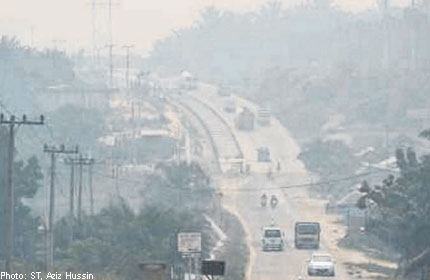
SINGAPORE - Frustration over the record-breaking haze has raised the question of what legal action Singapore can take against the companies responsible for the problem.
The Attorney-General has been asked to explore its options, and law experts have weighed in on what legal recourse might be available.
But even if Singapore firms are linked to the fires causing the haze, the Republic's environment laws do not give the Government any jurisdiction over their actions overseas - in this case, Indonesia.
This is true even if those actions result in environmental damage, such as air pollution, on home shores. Instead, Singapore's best bet to sort out the haze would be to hold discussions with Indonesia, or to make use of the ASEAN framework, lawyers said.
"The current laws are too rudimentary and don't give the Government much power to go after Singaporean companies, especially if the plantations don't belong to them but to their suppliers," said law firm Lee & Lee's senior partner Adrian Chan. "Even if the plantations were owned by them, there is no law that states that we can go after them because the burning happened overseas."
Indonesia said last week it is investigating private firms that might be responsible for the haze-inducing plantation fires. Officials and non-governmental organisations said some of the hot spots in Riau province were in concessions owned by companies with Singapore connections.
These include PT Sinar Mas Agro Resources and Technology, which is owned by Singapore-listed Golden Agri-Resources. Both are part of Indonesian conglomerate Sinar Mas Group. Asia Pacific Resources International, a paper-maker with its headquarters in Singapore but most of its physical assets in Riau, was also named. Both firms have denied that they are behind the fires.
Singapore's laws prohibit the open burning of waste, and criminal and civil penalties may also be levied against anyone found responsible for air pollution that causes personal injury or property damage or is a nuisance to others.

But these laws cannot be applied to parties or conduct beyond Singapore's national borders.
However, lawyers said it is theoretically possible to sue for negligence in the Indonesian courts if the private parties behind the haze are identified.
"If there is evidence that Indonesian-based corporations are responsible for violating domestic laws, and these laws provide for civil or criminal liability and compensation for the victims of... environmental damage, then... proceedings can be commenced in Indonesian courts," said Singapore Management University assistant professor of law Mahdev Mohan.
"There does not seem to be an option to do the same before Singapore courts for conduct that occurs outside Singapore."
Given the limitations of going after private companies, legal experts said diplomatic channels were the most effective way to thrash out a solution to the haze.
This beats seeking help from an international court, which would require Indonesia's consent, said National University of Singapore Centre for International Law director Robert Beckman.
"The matter must be addressed in bilateral discussions and in regional forums such as ASEAN," Associate Professor Beckman said.
But he said not all may agree the haze is an inter-government issue.
"It appears that, in Indonesia's view, the forest fires causing trans-boundary haze pollution in Singapore and Malaysia are not being caused or contributed to by the conduct of the Indonesian state authorities but... by nonstate actors like individuals, palm-oil corporations and their third-party sub-contractors," he said. "This view is difficult to dispute without proof to the contrary and it is therefore almost impossible to... characterise this matter as an inter-state dispute."
Singapore officials have been in talks with Indonesia to seek action and will be bringing up the haze issue at ASEAN meetings in Brunei this week.
Mr Chan said Singapore, through ASEAN, could urge Indonesia to ratify the ASEAN Agreement on Transboundary Haze Pollution.
Signatories are obliged to cooperate to prevent and monitor cross-border haze pollution due to land or forest fires, and to control such fires if they happen.
On a global level, more than 170 countries have signed the 1992 United Nations Rio Declaration on pollution control. It acknowledges the rights of states to develop their own resources but also obliges them to prevent activities within their territory that will cause pollution in other states. The declaration was partly based on the "Trail Smelter Case" between the United States and Canada in the 1930s, which pulled in both governments and led to the principle that nations must not cause significant harm to other nations through air pollution.
In the case, a smelter in Canada that processed lead and zinc produced smoke that damaged surrounding crops and forests in the US state of Washington. Its dispute with the farmers escalated into a government-level issue and was settled by an arbitration tribunal in 1941, which ordered the smelter to pay compensation.

